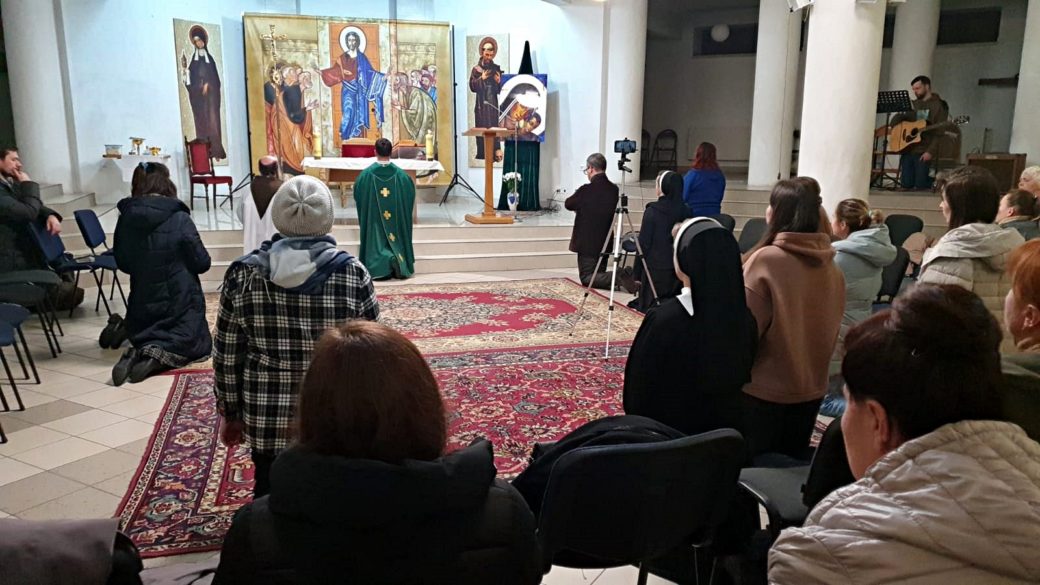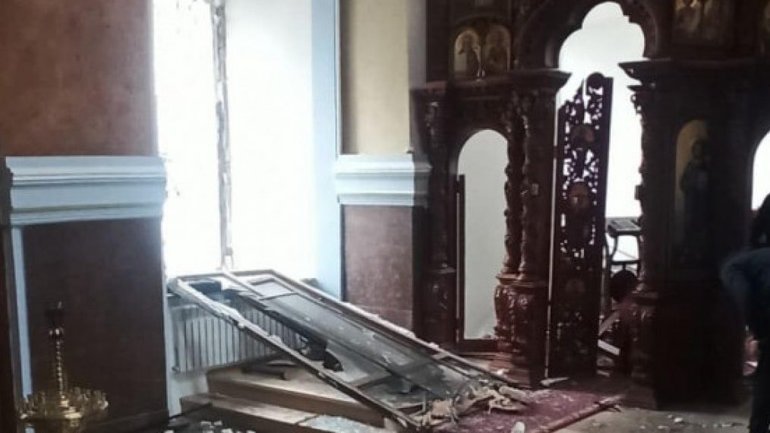Prayer for Ukraine
God of infinite mercy and goodness, with grateful hearts we pray to you today for peace. You offer us your peace continually (Jn 14:27) and constantly remind us that peacemakers are blessed, “for they shall be called children of God.” (Mt 5:9) May your voice resound in the hearts of all, as you call us to follow the path of reconciliation and peace, and to be merciful as you are merciful.
We pray to you for the people of the Ukraine who are experiencing conflicts and deaths. Bless the leaders with wisdom, vision and perseverance needed to build together a world of justice and solidarity, and to break down walls of hostility and division.
To you we entrust all families and pray that they may never yield to discouragement and despair, but become heralds of new hope to one another in this challenging time.
May you continue to inspire all of us to oneness of heart and mind, to work generously for the common good, to respect the dignity of every person and the fundamental rights which have their origin in the image and likeness of God impressed upon every human being.
Grant eternal rest to the dead and quick recovery to the wounded, we pray through Christ our Lord, Amen!
(Prayer adapted from: Pope JPII’s Prayer for Peace, shared by St. Stephen Pro-tomartyr Ukrainian Catholic Church, Calgary)
By Catholic News Service
WARSAW, Poland – Church leaders in embattled Ukraine have warned that foreign missionaries could be targeted by attacking forces, while many could be branded “NATO spies” if Russia occupies the country.
“Clergy from Western countries will certainly be at risk – the Soviet rulers viewed priests and nuns as Vatican spies, and now they’ll be spies of NATO and the European Union,” Auxiliary Bishop Jan Sobilo of Kharkiv-Zaporizhia told Catholic News Service March 3.
“Judging by what’s happened in other occupied areas, we can also expect restrictions on Masses and other activities. By defending Ukraine, we are also defending the Catholic Church,” he said.
A Polish priest in Kharkiv said he also feared repression against foreign clergy, especially those from Poland and other NATO countries.
“We were all given a free choice to leave or stay by our bishops – and while a few have had to go, almost everyone else has remained,” Father Wojciech Pasiewicz, director of the church’s Caritas Spes charity in the partly destroyed eastern city, told CNS March 3.

“Given the restrictions and controls placed on freedom and democracy in Crimea and other regions, we can clearly expect the same here and anticipate real dangers from the Russians,” he said. “But what matters now is that this war ends, and people are allowed to return to their homes and churches.”
“We are simply praying and doing all we can to stay in touch with our faithful, while many hide out in parish basements,” Father Pasiewicz told CNS. “The children are terrified, and there’s fear and panic everywhere, with some still hoping to be evacuated. We should all be praying for peace and mourning the dead, uniting in hope that this will all end today or tomorrow.”
Bishop Sobilo told CNS the civilian population had now mobilized to defend the country. He said many Russian soldiers appeared “disorientated and demoralized” by the fierce Ukrainian reaction, but feared being shot if they attempted to surrender and withdraw.
Hundreds of Polish priests and nuns have helped run Catholic parishes and charity projects since Ukraine’s 1991 independence and are currently stranded in its eastern and southern war zones.
Polish Father Piotr Rosochacki, who heads Caritas-Spes on the Black Sea, told the Polish Catholic news agency KAI the situation was growing “increasingly desperate,” adding that “all principles for waging war” had been violated in the bitter fighting.

Meanwhile, the Caritas director in Mariupol, Father Roscislav Spryniuk, told KAI attacking Russian troops had fired on residential areas, adding that shops and cashpoints were now empty.
Bishop Sobilo told CNS some Polish clergy had been forced to leave for health reasons or a lack of relevant documents, adding that he had ordered one priest to quit his parish, unwillingly, fearing harm from Russian troops.
However, he added that the “decisive majority” had remained in place, helping people who had fled other cities.
“In Russia itself, the Catholic Church isn’t well regarded and has continual problems,” he told CNS. “So we can be sure we’ll find ourselves in a very difficult, bad situation if we’re occupied.”
Russia’s forces, amassed in border regions since last fall, invaded Ukraine Feb. 24, triggering harsh resistance from the country’s 200,000-strong armed forces, as well as a sharp fall in Russia’s ruble currency amid Western economic sanctions and pledges of military assistance.
Russian troops continued to close on Kharkiv, Ukraine’s second-largest city, March 3 as tens of thousands fled the fighting and Western governments backed an investigation by the International Criminal Court into alleged war crimes by invading forces.
Shelling damaged the Assumption Orthodox Cathedral in Kharkiv, reportedly with windows and other decorations broken, The Associated Press reported March 3.
In his national address that day, Ukrainian President Volodymyr Zelenskyy pledged to restore Kharkiv’s cathedral.
“Even if you destroy all our Ukrainian cathedrals and churches, you will not destroy our sincere faith in Ukraine and in God,” the president told Russians.
